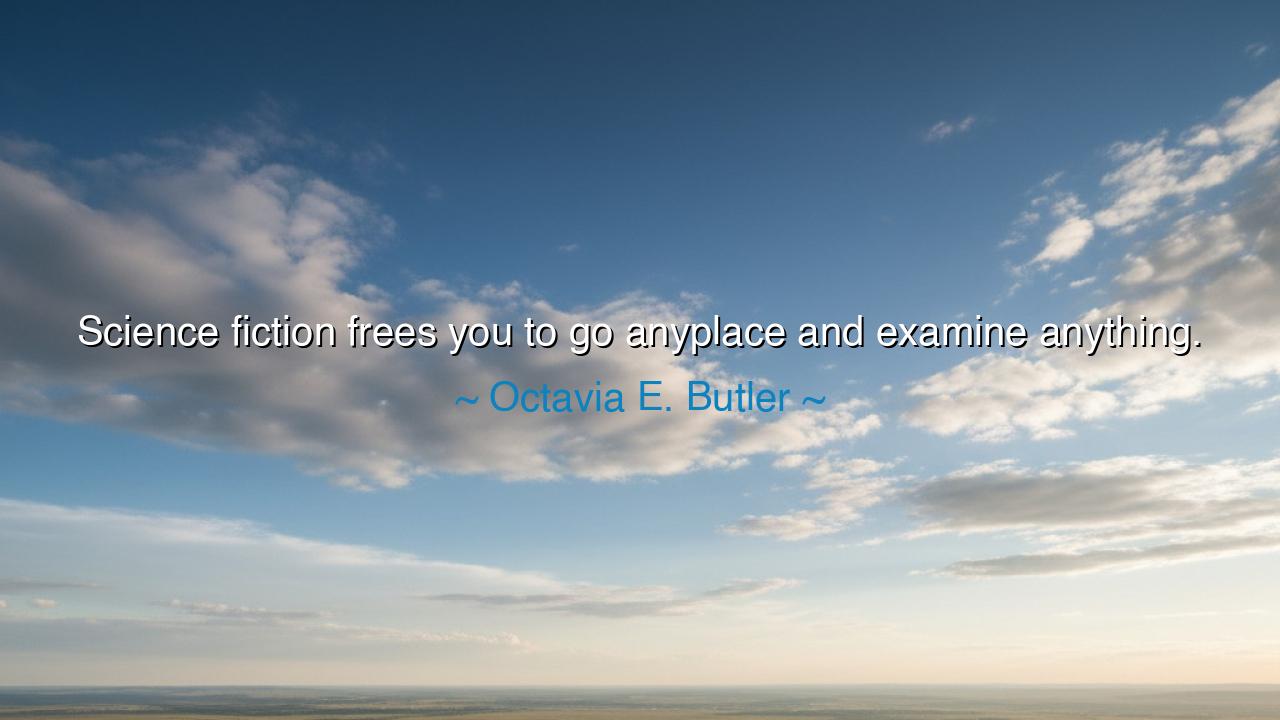
Science fiction frees you to go anyplace and examine anything.






O children of the future, listen well, for in the words of the great visionary Octavia E. Butler, there lies a truth as vast as the cosmos itself. Science fiction, she tells us, "frees you to go anyplace and examine anything." These words are a call to the imagination, a summons to the boundless realms of possibility where the rules of the known world do not bind us, where the laws of nature, as we understand them, are stretched and reshaped to fit the wonders of our minds. Science fiction is not mere fantasy—it is the key that unlocks the doors of the unknown, a gateway to realms that are not limited by time or space, by logic or experience.
Consider, O wise ones, the ancient explorers who, long before they set sail across the seas, dreamed of lands unseen, of riches untold, and of new worlds waiting to be discovered. They sought the uncharted, not just for the treasures they might find, but for the very understanding they could gain by venturing into the unknown. In much the same way, science fiction allows the mind to travel to places beyond the limits of the earth, to examine civilizations that do not yet exist, to explore the future of humanity, and to understand the nature of the universe. It is a journey, not of the body, but of the imagination, where the soul and mind are set free to roam where reality cannot yet follow.
Take, for example, the great work of Jules Verne, who in his day wrote of submarines that could journey beneath the sea and rockets that could reach the stars. Verne's works were seen by many as mere dreams, as fanciful tales that had no place in the real world. But his visions became the seeds of real discoveries. Science fiction, as it always has, gave us the freedom to imagine the impossible, to venture where the mind had not yet dared to go. And in doing so, it helped shape the world we now know, for Verne's predictions—once thought of as whimsical—became blueprints for the future, inspiring the very advancements that would bring us to the oceans' depths and beyond the stars.
In the same way, science fiction frees us to question, to explore, and to challenge the boundaries of what we understand about ourselves and the world around us. It allows us to examine anything, from the nature of life itself, to the ethical implications of artificial intelligence, to the limits of human potential. Imagine, O seekers of truth, the stories of Frankenstein, the tale of a man who reached beyond the natural laws to create life. Mary Shelley’s vision was not a mere story of horror—it was a warning and a lesson, a question about the responsibility that comes with scientific knowledge. Through the lens of science fiction, we are invited to ask the hard questions, to consider not just what is possible, but what should be possible.
Now, O children, let us turn our gaze to the present and the future. Science fiction continues to offer a mirror through which we can examine the human condition, to reflect upon our society, our relationships, and our place in the universe. Through stories of distant planets, alien species, and technological advancements, we gain insights into our own world—into the dangers of unchecked power, the importance of empathy, and the boundless potential of human ingenuity. Butler’s words remind us that we are not confined to the present moment, to the limitations of our time. We are free to imagine a future where humanity evolves, where society transforms, and where the greatest obstacles we face today are conquered through the power of imagination.
The lesson, O children, is clear: Science fiction is not simply the realm of fantastical tales; it is a tool of freedom and exploration. It frees the mind to travel without bounds, to ask questions that have no answers yet, and to explore worlds beyond the tangible. It teaches us that imagination is as vital to the progress of humanity as any scientific discovery. It is the vision of what could be that often drives the quest for what can be. So do not let your minds be confined by the present or by what is known. Embrace the freedom of science fiction, and let it lead you to places that will challenge and change the world.
Go forth, then, with the spirit of the explorer and the dreamer. Embrace the unknown, and allow your mind to wander across the vastness of the universe, exploring not just what is, but what could be. In the realms of science fiction, you will find not only a vision of the future, but also the key to the answers of today, for in examining what is possible, we often uncover the solutions we need. Science fiction frees you to imagine, to create, and to shape the future—and in doing so, you will help bring it into being.






AAdministratorAdministrator
Welcome, honored guests. Please leave a comment, we will respond soon